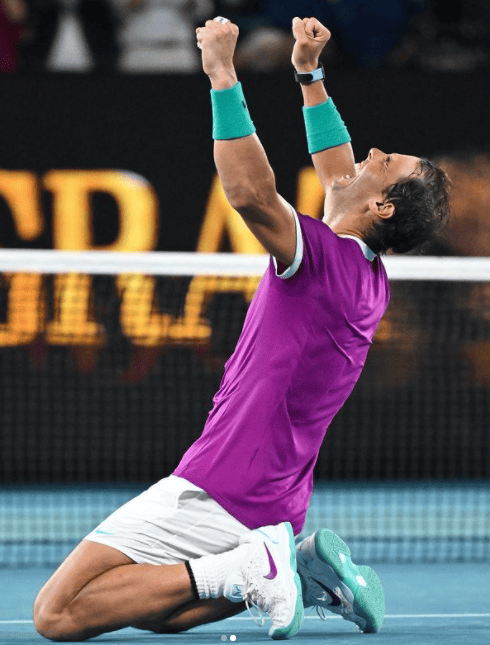Opinion | Rafael Nadal’s resilience redefined sports during COVID
Courtesy of the Australian Open
Spanish tennis player Rafael Nadal celebrates after his 5-set win over Russian tennis player Daniil Medvedev on Jan. 30, 2022.
February 1, 2022
After two weeks filled with deportation scandals, vaccine debates and player resurgences, the 2022 Australian Open is over.
Spanish tennis star Rafael Nadal capped off the fortnight in Melbourne with a victory over world No. 2 Daniil Medvedev in just under six hours. Nadal’s triumph is his second Australian Open title and his 21st Grand Slam title. He now stands alone with the most majors for a men’s tennis player.
Nadal winning in Australia is a storybook ending for fans who have seen him lose in four Australian Open finals, but his win paints a picture of how resilient the world of sports needs to be during the COVID-19 pandemic.
Vaccine chaos
On Nov. 19, 2021, Australian Open Director Craig Tiley announced that the slam will require players and participants to be fully vaccinated. This ended months of speculation and mixed messages from Australian officials.
“It is the one direction that you can take that you can ensure everyone’s safety, and all the playing group understands it,” Tiley said. “Our patrons will need to be vaccinated. All the staff working the Australian Open will need to be vaccinated, but when we’re in a state where there’s more than 90 percent of the population fully vaccinated — they’ve done a magnificent job with that — it’s the right thing to do.”
Current world No. 1 and Serbian tennis player Novak Djokovic was the clear favorite to win the Norman Brookes Challenge Cup for a record-extending 10th time. There was only one thing standing in his way: his vaccination status.
Djokovic has been vocal about refusing a vaccine since April 2020 — well before vaccines were made available to the public. He’s since redefined his opinion, stating that he wants to have “an option to choose what’s best for my body.”
The uncertainty around Djokovic’s status remained until he announced on Instagram that he’s making the trip Down Under on Jan. 4, 2022.
This sent the tennis world into a tailspin and started a lengthy, complicated journey.
Players couldn’t just focus on the warmup events that week. All eyes were on Djokovic versus Australia. The media asked any and every player about the situation. Some gave their opinion. Others did not.
“Is my opinion going to help anything?” Japanese tennis player Naomi Osaka said. “I’ll pass on that. Thanks, though.”
Opinions weren’t going to fix the mess the Australian government had on its hands, but swift and effective actions could. In the span of two weeks, Djokovic’s visa to enter Australia was canceled twice. The second was the fatal blow to Djokovic’s title defense.
This wasn’t the end of the battle. Tennis Australia had to pick up the pieces and determine how to get fans interested in a tournament missing arguably its biggest star.
The show had to go on, and plenty of other stars were ready to play, including Nadal.
A run for the storybooks
Nadal made his return back to the tour in January after being sidelined for five months with a foot injury — an injury that put his tennis career in limbo.
“I don’t know when I will play again,” Nadal said. “There are always things that I can’t control 100%. But inside my head I’m clear on what my objectives are, and I trust that things will follow a positive course.”
It was quite the setup: a tennis tournament needed to regroup after a major political scandal, fans were eager to see Grand Slam tennis, and a player fought to find happiness in the sport again.
An imperfect and sometimes volatile situation created the perfect outcome. Tennis healed itself from the drama by simply focusing on the athletes there.
Nadal had plenty at stake traveling to Australia. He didn’t play much before the Australian Open — just 13 tournaments over the past two years — so winning the title was not on his mind.
“As I said before the first tournament, I am here just with the clear goal to be back on the tour,” Nadal said before the Australian Open. “That’s the most important thing, and then if I’m able to win matches and be improving every single day, fantastic, no?”
Many expected Nadal to fall in the early rounds of the tournament. Nadal himself didn’t see him contending for the title. But soon enough, Nadal won six matches and advanced to the finals of the Australian Open.
The only thing that stood in Nadal’s way was Medvedev, arguably the best hard-court player on the men’s tour. Medvedev just defeated Djokovic for his first grand slam title at the U.S. Open in September 2021.
The stage was set.
A satisfying conclusion
The world of sports provides stories of immense joy and heartbreak. But certain games, moments and athletes can change how fans feel about a sport.
That’s exactly what Nadal accomplished on a humid Sunday night in Rod Laver Arena.
A few weeks ago, tennis fans expressed exasperation with the sport. Djokovic’s vaccine scandal permeated every corner of the game and took eyes away from the tennis being played in Australia. When Nadal and Medvedev walked onto the court Sunday night, fans were desperate for a great conclusion.
Instead, they witnessed history.
Nadal was competing for a plethora of accolades. A win would make him the first man to surpass 20 Grand Slam titles. He would be the fourth man to win all major titles twice. Most importantly, it would solidify that he could still compete and win titles just three months away from turning 36.
It wasn’t easy. Nadal was down 2 sets and was almost broken at love at 3-2 in the third set, but he persisted and won the title in 5 grueling sets. It was his first comeback from 2 sets down since 2007 and the first in the Open Era to do so in the men’s final.
“A battle that defies belief, defies description,” ESPN analyst Chris Fowler said on the broadcast.
For the past two years, the world has been facing a battle that defies belief and description. The world of sports, just like people around the world, had to adjust to living with COVID-19. The state of Victoria, Australia, has gone into lockdown seven times since March 2020. Nothing has been easy.
Nadal’s triumph is a story of how immense sacrifice can have a satisfying payoff. Tennis Australia made the choice early to protect fans and residents, even if it meant not having the defending men’s champion on the court. Nadal has sacrificed and “suffered” throughout his career.
A major that was marred by one player’s arguably selfish actions was changed by another player’s undying will to persevere to the end.




















